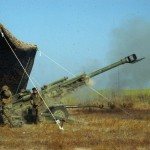War & peace – Ask the Rabbi
Q. What is the Jewish teaching about war?
 A. Judaism is not pacifist, but it believes in peace.
A. Judaism is not pacifist, but it believes in peace.
The Jewish greeting is Shalom. Our major prayers culminate in a plea to God to send peace onto His world.
No ideal is greater; the sages say, “Great is peace, for all blessings are contained in it”.
No dream is more compelling than the abolition of war: “Nation shall not lift up sword against nation, neither shall they learn war any more; they shall not hurt or destroy on all My holy mountain” (Isa.2:4).
But because this is still an imperfect, unredeemed world, there are threats which can only be contained by force of arms.
Not that one should glorify or enjoy the fight, and the way a war is waged must follow clear moral guidelines. Non-combatants should be safeguarded from injury as far as possible. Prisoners of war must not be mistreated. Trees must not be wantonly destroyed nor the environment polluted.
Jewish law knows of two basic categories of war: the milchemet reshut (permissible war), aimed at expanding territory and not undertaken without the permission of the Sanhedrin; and the milchemet mitzvah (commanded war), waged in self-defence, including a pre-emptive strike. This category may be proclaimed without the consent of the Sanhedrin.
No war today is automatically either a permissible or commanded war, because the traditional mechanisms empowered to declare war are no longer in existence.
The milchemet reshut is thus not a modern option; the milchemet mitzvah is more feasible, but only with halachic approval, as was the case with the first Lebanon campaign which the Israeli Chief Rabbinate Council deemed to be justified as a means of defending Jewish settlements in Galilee.
Rabbinic authorities both in Israel and the Diaspora, also approved the First Gulf War, stating that Israel as well as human moral values were in danger and had to be defended.
Rabbinic responsa, especially since 1948, have addressed many halachic questions arising out of war, for example:
• May a Jew be a conscientious objector?
• May exorbitant conditions be accepted in order to get back prisoners of war?
• May a Jew serve as a mercenary in another nation’s army?
• May one bring weapons into the synagogue?
• May Israel sell arms to other countries?
• May yeshivah students claim exemption from military service?
• May one transgress Shabbat and kashrut in wartime?
• May a kohen be a soldier?
• May the wife of a Jew whose submarine has disappeared be deemed a widow?
These responsa deserve publication in English.
St Augustine, who codified for the Christian world the terms and conditions of a just war, remarked that the tragedy is not so much to kill as to hate.
For Judaism, a telling moral lesson is taught by Beruriah, the wife of Rabbi Meir, who said one should pray that the sin, not the sinner, be removed from the earth.
Our greatest prayer and dearest yearning must be that the conditions which produce human hatred and hostility be eradicated from people’s hearts and minds, so that the thought of war will no longer be possible and wars will cease of their own accord.



